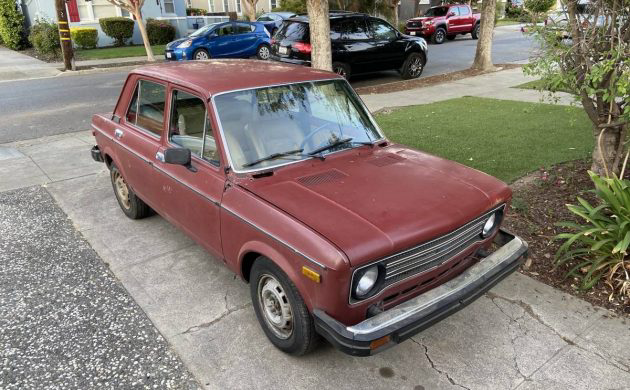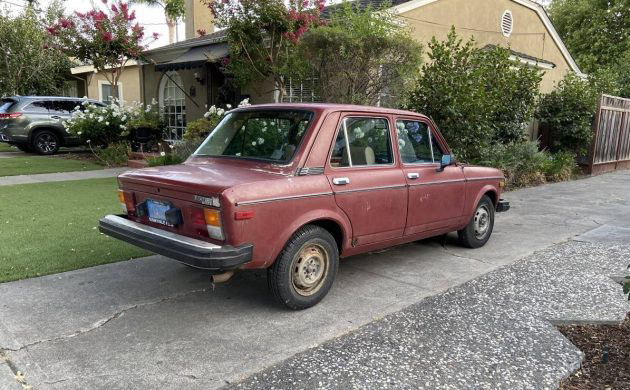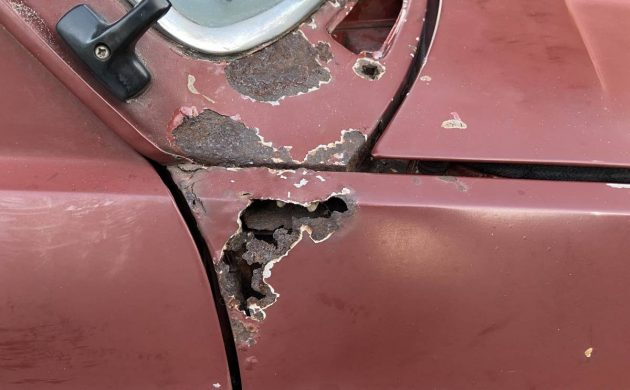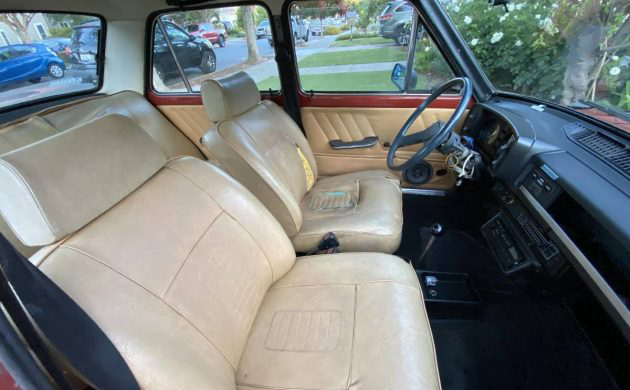Repair or Part Out? 1979 Fiat 128
The Fiat 128 was a small econobox built in Italy between 1969-85 but only imported to the U.S. from 1971-79. It would sell relatively well in the ’70s because the OPEC oil embargo drove up the price of gasoline. Due to quality control and premature rust issues, few of these cars survive today. One exception is this 1979 Fiat 128 that was on its way to the scrapyard before the seller saved it. Whether it’s worth restoring or using for parts will be in the eye of the beholder. Located in Willow Glen/Cambrian, California, this little car is available here on craigslist for just $250 and the seller provides more details and photos than you usually see for cars selling for 100 times that amount. Kudos to Shervin for finding this old Italian auto for us!
Because of its transverse engine and front-wheel-drive layout, the 128 had an especially large passenger compartment and would become a standard for small cars worldwide. Three million of the little sewing machines would eventually be produced and the 128 was named “European Car of the Year” in 1970. This ’79 edition is the 4-door model and has 78,000 miles on the odometer, having flipped over at least once. The seller would be its third owner, although there are no title, paperwork. or keys to go with it.
This little car is fraught with problems and restoring it would have to be a labor of love because you could never recoup your investment. Or you could use it for parts. The seller has taken a particular interest in this one even though it has a minimal resale value at this stage. A ton of photos are provided via this link. He did some homework before putting it up for sale and determined that it’s in non-operating status with the DMV and the police do not have it on any stolen car lists.
There is a significant amount of corrosion in the sheet metal, although we’re told the chassis itself is still solid. Most of the rust started because the car was parked under a pine tree for years and that stuff can wreak havoc with steel when mixed with water. If you go over every body panel, you’re going to find rust from minor to see-through. Despite all this, the interior looks good for the age, with the driver’s bucket seat being the only casualty.
The car can be fired with starter fluid, but the fuel system is contaminated after all these years. The Fiat has brakes, but their operating condition is minimal at best. And the tires are shot from age and rot. So, maybe – just maybe – there is an opportunity here if you look at this as a keeper because even the seller admits it won’t be worth half of what you’ll have to put into it. But the 128 was a well-engineered car that set the stage for others to follow, even if wasn’t the best-built car ever made.
Auctions Ending Soon
 2002 Subaru Impreza WRXBid Now1 days$333
2002 Subaru Impreza WRXBid Now1 days$333
 1975 Chevrolet Corvette ConvertibleBid Now1 days$4,000
1975 Chevrolet Corvette ConvertibleBid Now1 days$4,000
 1964 Ford F-100 Camper CustomBid Now1 days$2,000
1964 Ford F-100 Camper CustomBid Now1 days$2,000
 2006 Jeep Wrangler SportBid Now3 days$11,000
2006 Jeep Wrangler SportBid Now3 days$11,000
 1974 Datsun 260ZBid Now5 days$750
1974 Datsun 260ZBid Now5 days$750






Comments
“Fix It Again Tony” takes on a whole new job with this one….
My next door neighbor had one, purchased new. Bright yellow. It was no Vette, but it got close to 50mpg. Consistently.
You could crush it, but you would only get around $1.25.
My dad bought one of these 128s new. A woman rear-ended him and claimed his brake lights didn’t work. When the car was turned off, the cop checked, and the lights didn’t work, so the police report blamed my dad for faulty lights. No one knew (including my dad) that the car had to be running for the brake lights to work. Needless to say, that was my dad’s last Fiat.
I’ve owned more Fiats than I can recall – probably 30+ and the 128 is pretty far down the list of my favorites. 1950’s and 60’s Fiats were quite well made and fun to drive. In the 70’s, poor steel quality became quite an issue and Italian labor struggles didn’t help. The RWD cars were still pretty good but the 127 and 128 were pretty grim econoboxes. I can’t quite think of any particular advantages other than that they were cheap to buy and cheap to run. But they are slow, noisy and seemed to lack the fun to drive aspect that most Italian cars have.
As a side note, for anyone interested in Fiat (or just in a good movie) you should look up the documentary “Agnelli”. I thought it was absolutely fascinating – and as I work for an Italian owned company it’s interesting to see how the Patriarchical business culture hasn’t changed much to this day.
I had a 127 for a bit – it had a 1.3 litre engine and buzzed along quite well. I haven;t seen a 128 in years.
Thanks for accepting my submission. The reason I sent this in is because it’s the type of forgettable econobox that you never ever see anymore. It’s a relic from another period: the big-bumper-oil-crisis-wide-necktie era called the 1970s.
That’s with good reason of course, given their horrendous build quality, but still. That’s the only reason I hope it gets saved, even though I know it’s a long, long, long shot. If I were to put it politely, someone would have to be squarely out of their mind to attempt a project like this.
The fact that it still has its original California plates from 1979 is even more impressive.
“Box”, yes. “Econo”, ehhhhhh – no. As a planter, it might be worth a few bucks.
This is a parts car, it has nothing going for it other than it’s inexpensive.
Steve R
These days, any car with stick shift starts to look interesting, no matter what condition it’s in.
Odometer flipped over? Nah, you were lucky to get 80K US miles. Salt and interstates were never their intent. Never ceases to amaze me, we were driving LTD’s with 429 motors, and the poor Europeans struggled along with these. I believe, this was, and maybe still is, the most popular car in Europe. Personally, I don’t care for Fiats, but I don’t think they were any worse than any other car. I’m sure the Italians laughed at what we had to offer( Vega, Pinto, Gremlin) and I actually remember quite a few of these, until Asian cars took over. Since they were scrapped as fast as they were made, I’d think if anyone actually collected these, be a great parts car.
This is the kind of car I look for Barn Finds to highlight…..the seldom seen relics of yesteryear. Unfortunately, the cancer may be terminal for this one. Anyone who takes it on would have to do so out of a passion for the car….not looking to get their money back.
I miss cars like this being around. They had character.
This brings back lots of memories! My dad bought a 128 hatchback (if you could even call it that!) new in 1975. We’d just moved to Denver, and it was good in the snow. That was about it. It was a horrible olive green color with tan vinyl seats. Dad used to call them “real genuine imitation plastic.” He said it came with tilt steering, “…but only if you pulled hard enough. And it cracks a lot.” He had a lot of fun with it, until we moved to Brownsville, Texas, where he worked across the border. Driving it in Mexico was a challenge because it would disappear into the potholes. Then he bought a pickup just to survive the traffic and the roads.
Its a shame its not in better condition, even if it is worth more by recycling it with your soda cans…
It’s too bad about the rust. I drove a new one in 1973 and remember it was huge fun. Really peppy and very nimble handling. More fun than a Miata.
24 hrs of Lemons is beckoning for this relic. Only car (IMHO) that makes a Trabant look stylish.
Q – Who restores a Fiat 128 and needs parts from this heap?
A – No one.
They survive pretty well in Africa with examples clocking over 200 000 miles with relative ease and mechanical spares still available.
Fiat had a 128 “bakkie” van and panel van and there are still many running around, not so much the hatchback. A very honest little car.
Restomod it with SRT-4 running gear.
DO not purchase unless you’re OK with hooking the Clutch cable back up several times a day. One of my Navy shipmates bought one new. Never could keep the clutch cable on. I still see him lying in the snow on the side of the road in CT fixing that cable–this one was same color too.
Well, at least the craigslist ad is pretty good and leaves almost no questions to be asked. And the price is right for a project start. Also way more pictures than a guy selling a rust bucket mustang of the same year.
My father owned one when we were young kids…went from showroom to junkyard in three years due to unrepairable structural rust damage.
Neat little car. Deserves some love. Not nearly as rusty as I remember seeing some. Other than the fender and that surface crusty cowl panel, it’s a set of Cromadora wheels and some recommissioning work away from being very cool. Good thing it’s not close. I’d be tempted to recreate the Polistil Fiat 128 rally car I had as a kid.
Wasn’t this a precursor to the beloved, Yugo.?
Fiat used to advertise these as the car Enzo Ferrari drove. As far as the innovative FWD design with transverse engine – that was popularized and darn near perfected by the Austin Mini a decade before the Fiat appeared . . . who fact checks your writers?
There was a lively amount of 128-centric activity back when I was missing the one that I’d had to give up on. Yugos were still coming in, and there was a firm that was buying, refurbishing and selling blocks, parts and whole engines. Unfortunately, nobody could do much for the metal box it all had to go into. That’s a pity, since I’d found that an early pre-Giant Bumper body was a lot nicer and quicker to drive, though mine was no slouch. But even then they were rusting too fast (at least in Tennessee) to keep up with any maintenance. I was seriously thinking about Yugos, too, but had two running other vehicles and a full barn … and She Who Must Be Obeyed had put her foot down hard.
The best method to determine how much hidden rust is on a Fiat 128 is to first have it weighed at a local scrapyard, then look up the factory specs to determine it’s original weight.
Subtract the current weight from the factory weight, and you will know how many pounds/kilos of rust your Fiat 128 has lost.
And yeah, they rust so badly that it can be measured in pounds or kilos! We had a lime green 128 wagon as the shop “gofer” vehicle, you know, gofer parts, gofer pizza for the crew, etc. On a bet, we decided to weigh it at the local scrapyard, but first we had to remove all 5 plywood floors [wagon back area included]. Made sure all the fluids were topped up, and we weighed it. Difference was over 100 pounds compared to the original published weight!
That’s funny, Bill, I never heard rust described that way. I grew up with rust and a visual was usually all that was needed to determine the extent.
Howard,
Our poor little gopher wagon was terribly eaten by the tin worm, the worst I’ve ever seen on a 128. The bottom of the right front fender had been pop-rivited to the cowl, and when the cowl rusted away, the fender flapped with the wind. The bottom several inches of the outer door skins were simply gone. The top inner cowl areas leaked during rain, but other than trying to keep your feet dry, the rain water simply ran out the gaps between the plywood floors and the main body shell, as the floors were gone. What finally led to it’s demise was when the rear axle mounts rusted away and the axle shifted back several inches!
The whole thing came about because several of us were standing around one Saturday morning, when someone jokingly said aloud “I wonder how many pounds of steel had rusted away on the gopher wagon?
So we decided to make the Fiat as close to original as possible [less rust damage] and on Monday I drove it down to the local scrap yard. I knew the people there, and when I explained what I wanted to do, they laughed and said sure, let’s get it weighed!
One of my restoration mechanics, Alex, actually took out the owner’s manual and looked up the weight in the specification section, and sure enough, it was there!
In the UK they had a kit (pipe car) buggy that used 128 mechanicals with the powertrain shifted to the back. Went pretty well too seeing that it lost a few hundred pounds.
One way of recycling those unburstable mechanicals.
Clean the fuel system, fix the brakes, and put duct tape over the rust through. Cheap second car, or first for a teen.
Perfect for a teen you don’t care about. You would be hard put to find a worse death trap than this one.
Failure Is A Tradition My Fiat 124 had faded paint after 3 years and rust was not far behind. The head gasket leaked after 10K miles….fill up the oil and check the gas. Oh…it also got terrible gas mileage. Those were some bad cars!!
The couple of these that showed up in our northern Mass. town in the early 70’s were pure swiss cheese in just a couple of years.
This and the Datsun 510 were allergic to salt.
Hellcat motor, tube chassis. Seriously, wasting space with this turd? And all of us talking about it? Ha, ha
this may B where the mommie-mobile, kid buss, 2nd car – switched from Franks to the Italic (Renault to Fiat) coupla Dauphines (1 w/the ol semaphores) a Simca 1000 or 2 may B one “10” & a “16”? , then onto one of these & her freedom to get “her own car” (kids drove their own to school/sports, etc). And so she had 850s, 124 spiders and Lancia Beta Coupe B4 merica caught up (EXP & probe’n escorts) till the retirement from New England to Fla.
I just remember the 128s beein even more square, the back glass seemed v e r y vertical? May B just my comparison to all the fastbacks at the time…
All these econo-boxes served us very well but mostly because not given the typical merican treatment. Maintained daily & weekly as pride, enjoyment, ‘resect for the equipment’, interest in problem solving, and care. Here ‘set it & forget it’ seems the rule.
Served as the base for the X1/9
JerryS – The engine/transmission were the only real contributions to the X1/9, and stuck onto the other end, but there was about the same amount of smart thinking applied to both cars. It’s not easy to make an open car that is both light and rigid enough, but they did it pretty well. I’ve never driven an X1/9, but I had a very fun canyon ride in one. I would love one, but The Boss limits us to a total of three, and I’ve got my quota … and, like their 128 siblings, too many of them are rusting away.